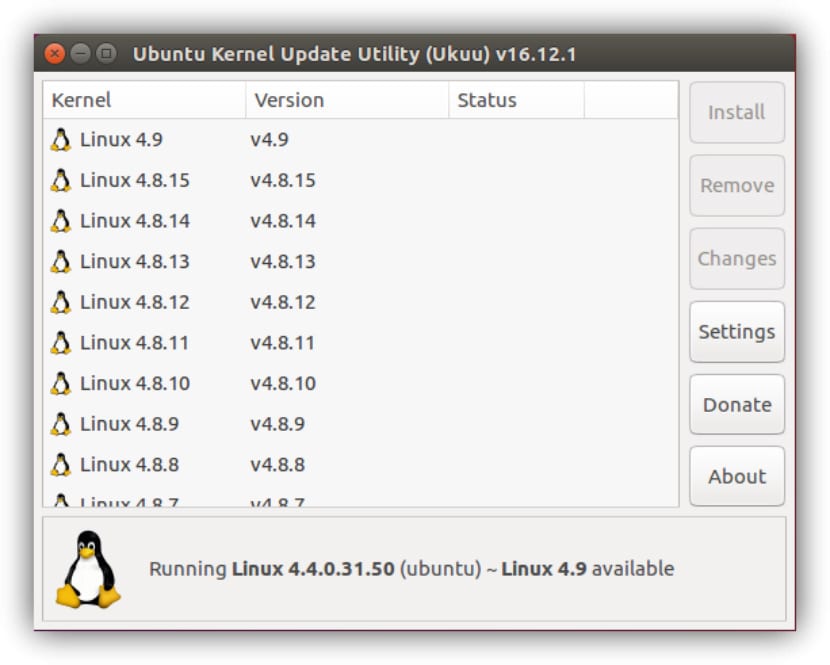
A few days ago the Linux kernel 4.19 was released, along with many improvements that have been implemented, and this version follows a long process of improvements around the other novelties that are still testing, but will still be released in versions later than this version.
That is why in this article we will see how to install this new version of the Linux Kernel in our beloved Ubuntu as well as in any other of its derivatives "that does not use a custom kernel".
Main novelties of the Linux Kernel 4.19
Among the highlights of the Linux kernel 4.19 we can find that this new version comes with:
- The VKMS DRM driver has been combined to configure virtual kernel mode. So this can be useful in advance for some systems.
- The alternate USB Type-C display driver has been combined with the mainline core to intensify DP-C Type support. However, there is still more work to be done on integrating with DRM drivers.
- Support for Qualcomm Adreno 600 series hardware.
- He continued to work on the creation of Intel Icelake "Gen 11" graphics.
- Raven Ridge stutter mode support, JPEG VCN engine support, GFXOFF and AMDKFD compute driver support for the latest AMD Zen + GFX9 APUs.
- Assembled the atomic mode setup.
- Differentiated console control support for FBDEV.
- Various other DRM improvements.
How to install Linux kernel 4.19?
In order to install this new version of the Linux Kernel, we must download the packages according to the architecture of our system as well as the version that we want to install.
It is important to mention that this installation is valid for any version of Ubuntu that has support currently, that is Ubuntu 14.04 LTS, Ubuntu 16.04 LTS, Ubuntu 18.04 LTS and the new version of Ubuntu that is version 18.10 as well as its derivatives.
For those who still use 32-bit systems should download the following packages, for this we are going to open a terminal and in it execute the following commands:
wget -c kernel.ubuntu.com/~kernel-ppa/mainline/v4.19/linux-headers-4.19.0-041900_4.19.0-041900.201810221809_all.deb wget -c kernel.ubuntu.com/~kernel-ppa/mainline/v4.19/linux-headers-4.19.0-041900-generic_4.19.0-041900.201810221809_i386.deb wget -c kernel.ubuntu.com/~kernel-ppa/mainline/v4.19/linux-image-4.19.0-041900-generic_4.19.0-041900.201810221809_i386.deb wget -c kernel.ubuntu.com/~kernel-ppa/mainline/v4.19/linux-modules-4.19.0-041900-generic_4.19.0-041900.201810221809_i386.deb
Now for the case of those who are users of 64-bit systems, the packages to download are the following:
wget -c kernel.ubuntu.com/~kernel-ppa/mainline/v4.19/linux-headers-4.19.0-041900_4.19.0-041900.201810221809_all.deb wget -c kernel.ubuntu.com/~kernel-ppa/mainline/v4.19/linux-headers-4.19.0-041900-generic_4.19.0-041900.201810221809_amd64.deb wget -c kernel.ubuntu.com/~kernel-ppa/mainline/v4.19/linux-image-unsigned-4.19.0-041900-generic_4.19.0-041900.201810221809_amd64.deb wget -c kernel.ubuntu.com/~kernel-ppa/mainline/v4.19/linux-modules-4.19.0-041900-generic_4.19.0-041900.201810221809_amd64.deb
At the end of the installation of the packages, we just have to execute the following command to install them on the system.
sudo dpkg -i linux-headers-4.19*.deb linux-image-4.19*.deb
Linux Kernel 4.19 Low Latency Installation
In the case of low latency kernels, the packets that must be downloaded are the following, For those who are 32-bit users, they must download these:
wget -c kernel.ubuntu.com/~kernel-ppa/mainline/v4.19/linux-headers-4.19.0-041900_4.19.0-041900.201810221809_all.deb wget -c kernel.ubuntu.com/~kernel-ppa/mainline/v4.19/linux-headers-4.19.0-041900-lowlatency_4.19.0-041900.201810221809_i386.deb wget -c kernel.ubuntu.com/~kernel-ppa/mainline/v4.19/linux-image-4.19.0-041900-lowlatency_4.19.0-041900.201810221809_i386.deb wget -c kernel.ubuntu.com/~kernel-ppa/mainline/v4.19/linux-modules-4.19.0-041900-lowlatency_4.19.0-041900.201810221809_i386.deb
O for those using 64-bit systems the packages to download are the following:
wget -c kernel.ubuntu.com/~kernel-ppa/mainline/v4.19/linux-headers-4.19.0-041900_4.19.0-041900.201810221809_all.deb wget -c kernel.ubuntu.com/~kernel-ppa/mainline/v4.19/linux-headers-4.19.0-041900-lowlatency_4.19.0-041900.201810221809_amd64.deb wget -c kernel.ubuntu.com/~kernel-ppa/mainline/v4.19/linux-image-unsigned-4.19.0-041900-lowlatency_4.19.0-041900.201810221809_amd64.deb wget -c kernel.ubuntu.com/~kernel-ppa/mainline/v4.19/linux-modules-4.19.0-041900-lowlatency_4.19.0-041900.201810221809_amd64.deb
Finally we can install any of these packages with the following command:
sudo dpkg -i linux-headers-4.19*.deb linux-image-4.19*.deb
Finally, we just have to restart our system so that when we start it again, our system runs with the new version of the Kernel that we just installed.
How to install Kernel 4.19 with Ukuu?

If you are a newbie or think that you can mess up your system by doing the above steps, you can make use of a tool that can help you simplify this kernel installation process.
I already spoke in a previous article about this Ukuu tool, which you can know and install from the link below.
It is enough to run the application on the system after having installed it and the program has the same ease of updating Kernel is very and simple.
A list of kernels is posted from the kernel.ubuntu.com site. and it shows you notifications when a new kernel update is available, and if allowed, it automatically downloads and installs the packages.
Can it be installed on a mobile that used android and replace it as the operating system?
That is, not only modify the appearance or interface or install a Launcher, but replace the operating system
I installed 4.19 on a buntu 16 lts but it had unfulfilled dependencies that were "impossible to fulfill" (according to comments in the terminal).
at this point you can correct the errors with "apt install -f", which will remove kernel 4.16 (apparently since 4.14 that this problem exists).
the friend who gives the problems is "libssl1.1", at least version 1.0 was installed on my system, which is insufficient.
Installing libssl1.1 is not such a terrible thing. it's at security.ubuntu.com/ubuntu (see: https://packages.ubuntu.com/bionic/amd64/libssl1.1/download)
Thus, sources.list can be opened from a terminal or with a word processor
in my case: sudo pen /etc/apt/sources.list
Add the following line to the file (and then save and close): deb http://security.ubuntu.com/ubuntu bionic security main
then install the mentioned libssl1.1
apt install libssl1.1
then, only after installing libssl1.1, you can install the headers, the image and the handle of the sword (although, perhaps, it could be installed later -I know less than a cat actually-) finally it is highly recommended do an update-grub just in case.
Kind regards from Berto the thinker.